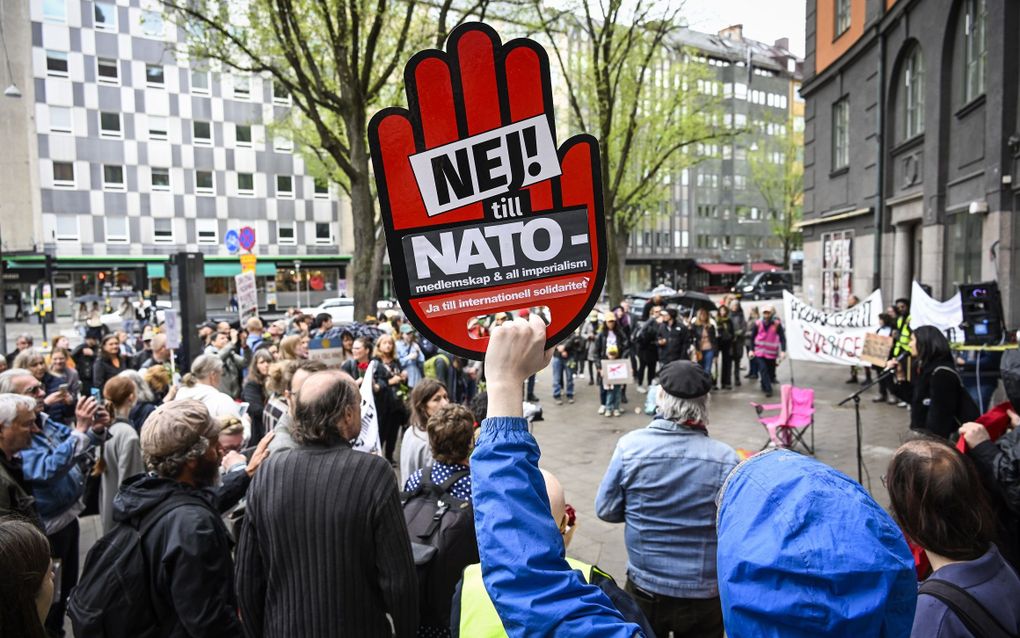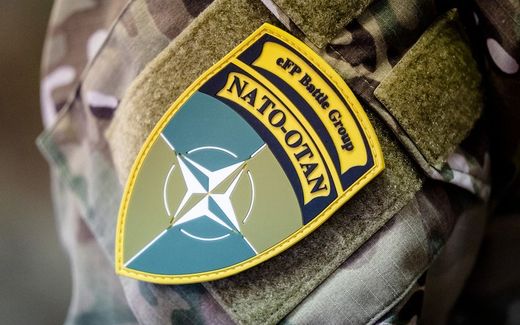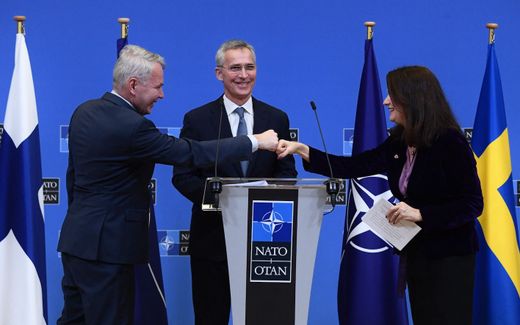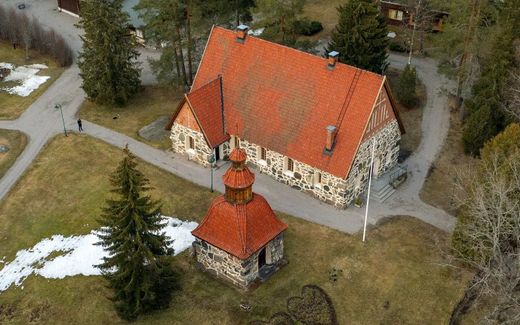“Let Sweden not join NATO, since it will not bring peace”

Swedish demonstration against NATO membership. Photo EPA, Anders Wiklund
Northern Europe
If an occupier came to her hometown, Lotta Sjöström Becker would rather hide in a shelter than kill him. In her opinion, violence can never solve violence. Instead, she would resort to non-violent means, such as civil disobedience. "Violence and war are never justified", she says. Therefore, she sees joining military alliances, such as the North Atlantic Treaty Organisation (NATO), as the wrong way to go.
NATO creates polarisation and destabilises security, Sjöström Becker says. She is the Secretary-General of the Swedish Fellowship of Reconciliation, a Christian Peace Movement (Kristna Freds Rörelsen). Sjöström Becker disapproves NATO membership. According to her, anyone who takes up arms does not constructively contribute to peace.

Recently, both Finland and Sweden submitted a membership request to NATO. They did so after Russia invaded Ukraine. By joining the international military alliance, the countries want to secure their national safety. Up till now, both had been neutral.
Why do you think joining NATO is such a bad idea?
"Military alliances with nuclear weapons lead to destabilisation and polarisation. Creating these agreements increases the number of available weapons because countries share their arsenal as they have to defend a member that is attacked. As a peace movement, we believe that increasing the number of weapons decreases security.
The Swedish Fellowship of Reconciliation (SweFOR)
The Swedish Fellowship of Reconciliation (Kristna Freds Rörelsen) is an organisation in Sweden that propagates peace. It was established by Christian pacifists in Sweden in 1919, right after the Great War. In 1968, it became part of the International Fellowship of Reconciliation. Currently, the Swedish branch exists of 900 members.
The Swedish Fellowship of Reconciliation is not connected to church denominations and political parties. However, it does receive donations from under more the Church of Sweden and the United Church in Sweden. Furthermore, it cooperates regularly with the Social Democratic Party – which used to be against NATO membership – the Green Party or the Left Party as they respond to and engage in its initiatives more than other parties.
Military alliances also create division by excluding others. By joining a military alliance, you align yourself to countries you then must be loyal to, even if you disagree with their policies. For example, by joining NATO, we have a treaty with Hungary, which propagates anti-democratic values. Furthermore, you distance yourself from nations not part of NATO, such as China and India, also nuclear powers.
In addition, our neutrality gave us credibility to some extent to point out violations of human rights and injustices in other countries. By joining a military alliance, we lose our impartiality and thus part of our credibility as a voice for peace and disarmament. For example, it sounds strange if we speak out against nuclear weapons while we are part of a nuclear alliance."
How would you justify your position from a Christian perspective?
"We see Jesus as a non-violent Role Model. During His ministry, He propagated a message of peace. Jesus underlined the importance of looking at other human beings with compassion and love. Killing our neighbour does not fit in that picture. For us, the Sermon on the Mount is significant. There, Jesus says that the peacemakers are called children of God.
I think it is Biblical to base our approach to other people on the question: How can we look for the good of both of us, rather than: how can I win this disagreement? That starting point provides us with a solid basis to point out injustices. It is not about making the other party lose, but about finding the good for all people."
Would you say that violence is never justified?
"I would call our organisation non-violent and we have a strong roots in the Christian pacifist movement. Yes, we are opposed to any form of violence. There is no solid justification for war and violence, which causes extreme human suffering. Furthermore, history and research have shown us that violence cannot lead to sustainable peace.
Having said that, I do not want to judge anyone who is in a situation where violence is the last resort to survive. Looking at the horrible situation in Bucha, where so many civilians were killed, I cannot imagine what I would do if I would be in their place. It is not my place to say from my office in Sweden that violence is wrong when someone will shoot you if you do not attack them first. That is an impossible moral dilemma.
However, I am confident that killing enemies does not solve the deeper problem that underlies conflicts. We cannot establish and maintain peace through darkness and revenge."
What would you do if an aggressor invaded Sweden?
"If we have failed with all attempts to prevent the violent conflict and are facing the fact that we will be invaded, we would use our well organized civil network and resort to non-violent resistance, instead of responding with military violence. First, we would have ensured close connections to non-violent partners abroad. They could help by negotiating with the aggressor or providing training to set up an organised resistance movement. We would protest against the occupier, for example, by civil resistance and non-cooperation, demonstrations but at the same time conduct negotiations. If you have an organised resistance movement a firm moral conviction, it is hard for an occupier to remain in control.”
How successful are non-violent means?
"They are effective. As our Swedish Fellowship of Reconciliation is part of an international peace network, we have long-standing partnership peace actors in, for example, Colombia. There we supported an organisation which propagated exemptions from compulsory military service. That led to legislation that made it possible to refuse service. The key to success is: How can we find each other without causing polarisation or tensions?"
Related Articles






